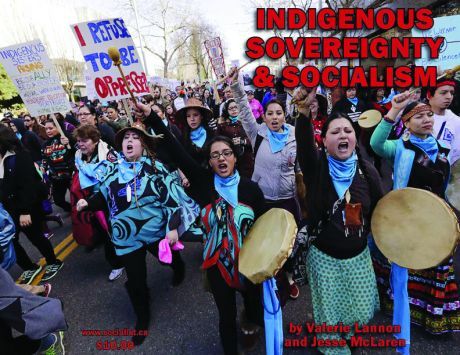Features
You are here
Indigenous sovereignty and socialism

October 31, 2018
Hats off to authors Valerie Lannon and Jesse McLaren for tackling the difficult task of producing a succinct overview of the struggle against colonialism, aimed at educating settlers who wish to become allies. The result is an excellent introduction to a big topic, a brief book that points readers to a wealth of literature by Indigenous writers.
Both are activists who bring expertise around climate justice to a view of Indigenous history and analysis of current struggles. This is a crucial link since connection to the land, and its stewardship, is central to understanding those struggles.
Kanesatake activist and artist Ellen Gabriel was talking specifically about the 1990 “Oka Crisis”, but her words could refer to Indigenous resistance from first contact to today: “We are a sovereign nation and our identity is linked to the land. That is why the government has tried so hard to break us, so that they can fully exploit our land.”
Three strands intertwine through the book: the history of colonialism both before and after the creation of the Canadian state, with its concerted attempts to destroy Indigenous cultures though both violence and subtle attempts at assimilation; indomitable Indigenous resistance and struggle that continues to this day; and the relevance of socialist ideas in understanding these histories and informing the struggles to come.
Marxism and Indigenous Culture
Lannon and McLaren make it clear that the relationship between Marxism and Indigenous culture is not a one-way street. Indeed, information about the organization of Haudenosaunee Confederation of Six Nations democracy and classless society was a huge inspiration to Marx and Engels. It proved the lie about “human nature” central to capitalism–that competition, greed and individualism were essential to human beings.
Instead, here were cultures where democracy, equality and sustainable relations with nature were the rule. This inspiration was central to one of the foundational Marxist texts, Engels’ The Origins of the Family, Private Property and the State: “All are equal and free–the women included. This is what mankind and human society were like before class divisions arose.”
Marx also wrote extensively about how capitalist relations broke the connection between human and nature, so that nature becomes an object to be exploited. According to Marx a healthy approach, one found among Indigenous cultures, said that nature was “man’s body, with which he must remain in continuous interchange if he is not to die. That his physical and spiritual life is linked to nature means simply that nature is linked to itself, for man is part of nature.”
Capitalism breaks this healthy metabolic connection–Marxist writers rediscovering the essential place of socialist ideas in facing environmental crises call this the “metabolic rift”. And Marx notes well how this rift if connected to the rise of capital, colonialism and the brutal exploitation of Indigenous peoples. In Capital Vol. 1 he wrote: “The discovery of gold and silver in America, the extirpation and enslavement and entombment in mines of the aboriginal population, the beginning of the conquest and looting of the East Indies, the turning of Africa into a warren for the commercial hunting of black skins, signalised the rosy dawn of capitalist production…”
These are crucial insights. They make the ideas of socialism a natural resource for Indigenous struggle–not just Eurocentric ideology. And it should make socialists resolute and respectful allies in the fight to expose and end colonialism.
So it is useful that Indigenous authors and historians who are influenced by Marxism – Howard Adams, Roxanne Dunbar-Ortiz, Glen Coulthard, Ron Bourgeault and others – are generously cited.
Struggle: Nation to Nation
The authors skilfully expose the way brutal practices like Residential Schools give way to today’s high rate of First Nations children being taken from their families by children’s aid workers. There is nothing new about Justin Trudeau’s practice of acknowledging Indigenous rights in the abstract, and opposing them when Indigenous nations exert those right on the ground.
There can be no resolution of colonial oppression until there is recognition of Indigenous national sovereignty–not the phony, less than municipal government concept on offer from Trudeau’s colonial state. And the good news is that there is now, more than ever, solidarity with Indigenous struggles from sections of settler society.
From the Red River Rebellions, to the rise of Red Power, to Idle No More the evolution and constancy of struggle is described and rightly celebrated. The mission of the book is summed up perfectly: “As socialists we want to learn from and support Indigenous sovereignty. As the two Row Wampum made clear 400 years ago, it is not up to settlers to steer the course of Indigenous national liberation movements but to provide unconditional support. This requires revolutionizing settler society, by building unity and solidarity within the working class, which includes Indigenous workers.”
Indigenous Sovereignty and Socialism makes a worthy contribution toward that goal.
• To order: within Canada, please send $15 ($10 + $5 shipping) payable to Socialist Worker, P.O. Box 339, Station E, Toronto M6H 4E3
Section:









